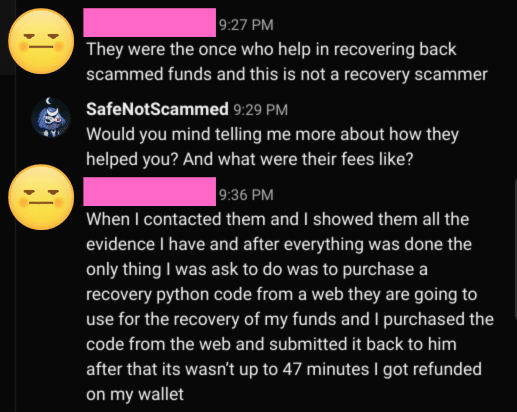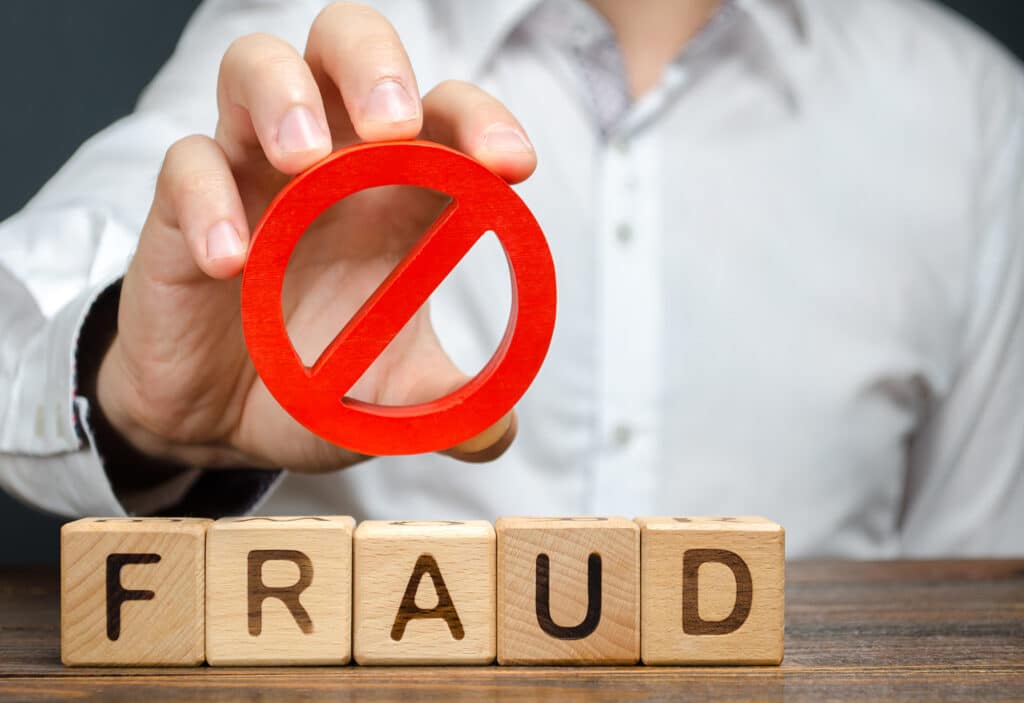Last updated on January 15th, 2024 at 04:26 am

If you think you’ve been scammed, it’s natural to want to ask for help or just vent on social media. Unfortunately, doing so will probably attract dozens of recovery scammers. In this post, I’ll explain how their scam works and how to avoid falling for it.
How recovery scams work
Recovery scammers target people who have already been scammed. If you lost money to a fake crypto exchange, had your Instagram account stolen, or sent money to a fraudulent love-interest, recovery scammers will promise to restore what you lost.
They often troll the comments on a scam victim’s social media posts, saying they were also scammed, but had all of their funds or accounts returned after contacting a particular “expert hacker” or “recovery professional.”
![Two Twitter posts from recovery scammers. The first says "I also got hacked, I was asked to prove my identity which I did but nothing worked, i sent appeal and my appeal was automatically denied I have to improvise [scammer's name] got back my account running perfectly." The second says "If you have the transaction hash or proof that you got scammed then quickly massage [scammer's name] get help with refunds they recover scam funds he's a genius"](https://safenotscammed.com/wp-content/uploads/2023/09/recoveryscammer.png)
If you’re a scam victim, this might make you think you’re in luck. After all, if this person had success with the “expert hacker,” maybe you will too?
Unfortunately, if you reach out to the recommended “expert hacker,” you’ll eventually be asked to pay an up-front fee for their services. Once paid, they will either claim you need to pay more to finish the recovery process or will simply ghost you. In either case, your original assets are still MIA, plus now you’re down whatever money you sent to the “expert hacker.”
To add insult to injury, recovery scammers may also try to get your personal information, which they can use to steal your identity.
A recovery scammer in action
To better understand recovery scams, let’s look at a recovery scammer in action.
After responding to a Reddit post about cryptocurrency scams, I received a DM from a scammer I’ll call Scamuel, who mistakenly thought I was a scam victim. Scamuel told me he too had been scammed, but touted the services of a “certified crypto recovery expert” who had miraculously recovered all the crypto he supposedly lost. However, the “recovery expert” was either Scamuel himself or someone he worked with to scam people.
As I was curious about Scamuel’s sales pitch, I decided to respond to his message. I asked him how the “recovery expert” helped him and what their fees were. He spun me an interesting story.

First, he reported having to provide “all the evidence” to the so-called recovery expert. While I don’t know exactly what evidence the “recovery expert” would ask for, it sounds like an opportunity for them to collect personal and financial information from their victim that could be used for identity theft.
Next, Scamuel revealed a fee was required. He explained, “the only thing I was ask to do was to purchase a recovery python code from a web they are going to use for the recovery of my funds.” He added that less than “47 minutes” later (an oddly specific amount of time), his stolen funds were returned.
So, in Scamuel’s scam, victims aren’t asked to pay the “recovery expert” directly, but are instead told to purchase a python code that somehow magically returns their funds. This code is also a scam, and the store that sells it is probably secretly run by the “recovery expert,” aka Scamuel or his scammer buddies.
When I ended my conversation with Scamuel by telling him I’d get in touch with his recommended “recovery expert,” he said rather brazenly, “Don’t forget to thank me once you have gotten your funds back.” What a creep!
How to avoid recovery scams

The best way to avoid recovery scams is to be wary of anyone claiming they, or someone they know, can help you recover stolen funds or online accounts.
Watch out for anyone who asks for up-front payment to recover your assets because they are almost certainly a scammer. But be aware that fraudsters might try to trick you into making an up-front payment by claiming that you need to buy a special tool, like Scamuel’s “python recovery code,” to help them recover what was lost. Or they may try to make their up-front fee look legitimate by claiming it is to cover the cost of a consultation with law enforcement. No matter the story, it’s all a lie. So don’t pay them money or provide them with further information. Instead, block them and cease all contact.
You might think you can avoid recovery scams if you don’t post about your experience on social media. Unfortunately, that’s not true. Once you’ve fallen for one scam, your contact details are added to a “sucker’s list” and sold on to other scammers. So, sooner or later, recovery scammers will try reaching out to you, be it by email, text, social media or even physical mail.
The takeaway
If you’ve been scammed, watch out for recovery scammers. They’ll promise to restore your lost assets, but will ultimately ask you to pay an up-front fee and won’t finish the job. So don’t fall for their lies, just block and ignore them.
